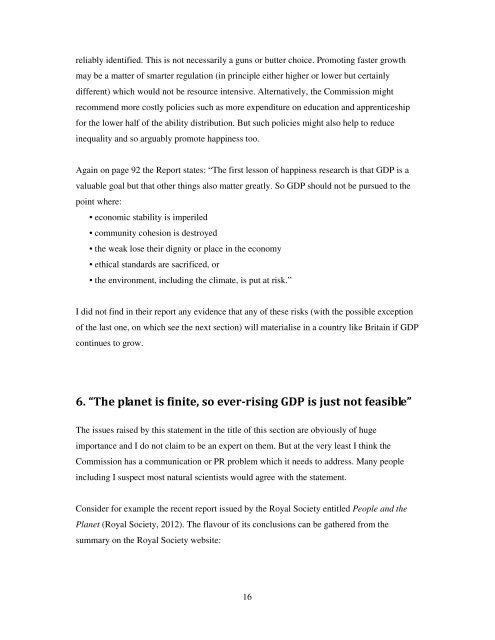You also want an ePaper? Increase the reach of your titles
YUMPU automatically turns print PDFs into web optimized ePapers that Google loves.
eliably identified. This is not necessarily a guns or butter choice. Promoting faster growth<br />
may be a matter of smarter regulation (in principle either higher or lower but certainly<br />
different) which would not be resource intensive. Alternatively, the Commission might<br />
recommend more costly policies such as more expenditure on education and apprenticeship<br />
for the lower half of the ability distribution. But such policies might also help to reduce<br />
inequality and so arguably promote happiness too.<br />
Again on page 92 the Report states: “The first lesson of happiness research is that GDP is a<br />
valuable goal but that other things also matter greatly. So GDP should not be pursued to the<br />
point where:<br />
• economic stability is imperiled<br />
• community cohesion is destroyed<br />
• the weak lose their dignity or place in the economy<br />
• ethical standards are sacrificed, or<br />
• the environment, including the climate, is put at risk.”<br />
I did not find in their report any evidence that any of these risks (with the possible exception<br />
of the last one, on which see the next section) will materialise in a country like Britain if GDP<br />
continues to grow.<br />
6. “The planet is finite, so ever-rising GDP is just not feasible”<br />
The issues raised by this statement in the title of this section are obviously of huge<br />
importance and I do not claim to be an expert on them. But at the very least I think the<br />
Commission has a communication or PR problem which it needs to address. Many people<br />
including I suspect most natural scientists would agree with the statement.<br />
Consider for example the recent report issued by the Royal Society entitled People and the<br />
Planet (Royal Society, 2012). The flavour of its conclusions can be gathered from the<br />
summary on the Royal Society website:<br />
16


